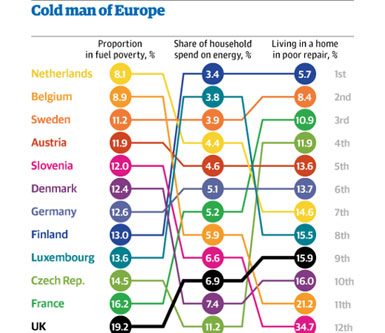Wales has joined Scotland in voting to ban fracking until it’s proven safe for public health and the environment – which can’t be done.
"It’s a historic day. This is a clear statement from the National Assembly for Wales that we want a frack-free Wales," exclaims Llyr Gruffyd, an assembly member.
"The world stands on the brink of environmental catastrophe," says Geraint Davies, another member. "If just one fifth of the available fossil fuels is burnt, global temperatures will grow beyond the two degrees tipping point that could send the world into irreversible climate change, with storms, floods, tidal waves, major disruption to our future food and water supplies, forced migration and conflict as growing populations are displaced and compete for scarce resources."
"Yet the dash for shale gas continues, egged on by a hunger from austerity provoked by a financial crisis caused by the irresponsibility of unregulated bankers," he adds.
He points to why fracking has been allowed to expand so much in the US. Former President Bush got the industry excluded from clean air and water regulations allowing the industry to grow without limits and without any accounting for environmental costs.
As Scotland banned fracking last week, the UK passed regulatory restrictions instead.
Landlords Can’t Rent Least Efficient Homes
In a great move, England and Wales passed regulations that bar landlords from renting the least efficient homes until they tighten them up.
It’s being hailed as the most significant legislation to improve the building stock, which includes some of the oldest in Europe. About a million tenants pay almost double in utility bills because their homes lack even basic insulation.

credit: Guardian
Landlords have until April 2018 to bring rentals rated F and G to minimum standards – an E rating. The new rules apply to almost 10% of 4.2 million privately rented homes, reports The Guardian. Tenants will be able to request improvements and landlords will be legally bound to comply or face penalties.
The move was proposed in 2010, but free market members of parliament have been against it. Various government support mechanisms are in place to help landlords finance upgrades.
"Government deserves huge credit for sticking to its guns. Some will undoubtedly cry ‘red tape’, but good landlords and forward-thinking property companies have nothing to fear," John Alker, acting CEO of the UK Green Building Council, told The Guardian.
Even the National Landlords Association favors the regulations. "The government has struck a delicate balance between making clear what is expected and ensuring that there is a realistic prospect of landlords being able to comply. Setting the standard at a sensible rather than aspirational level, allowing time to achieve it, and granting exemptions if the necessary improvements cannot be funded through the green deal or other government subsidies mean that these new regulations will not impose an unreasonable burden," Richard Lambert, CEO, told
The Guardian.

